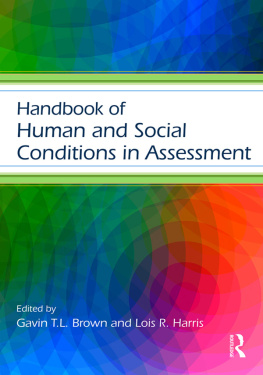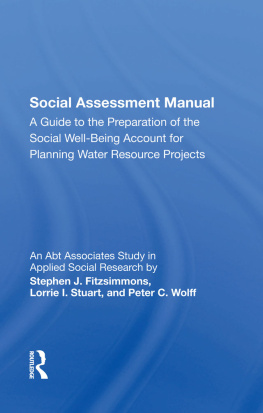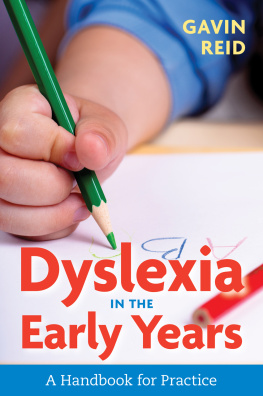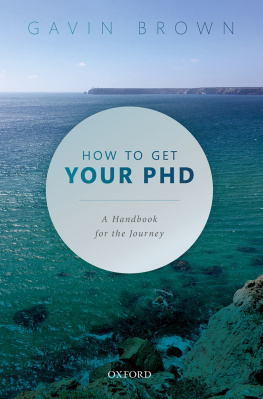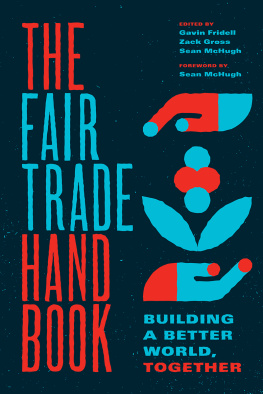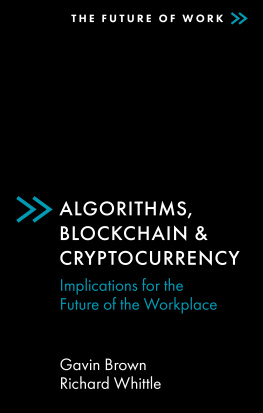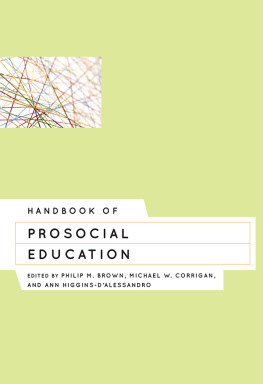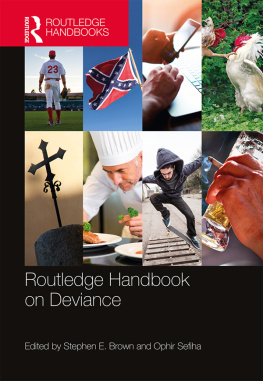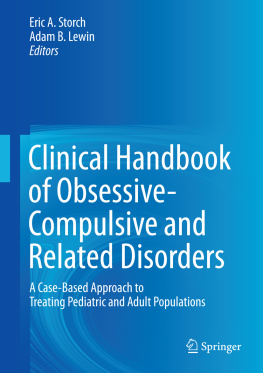Brown Gavin T. L. - Handbook of human and social conditions in assessment
Here you can read online Brown Gavin T. L. - Handbook of human and social conditions in assessment full text of the book (entire story) in english for free. Download pdf and epub, get meaning, cover and reviews about this ebook. year: 2016, publisher: Routledge, genre: Romance novel. Description of the work, (preface) as well as reviews are available. Best literature library LitArk.com created for fans of good reading and offers a wide selection of genres:
Romance novel
Science fiction
Adventure
Detective
Science
History
Home and family
Prose
Art
Politics
Computer
Non-fiction
Religion
Business
Children
Humor
Choose a favorite category and find really read worthwhile books. Enjoy immersion in the world of imagination, feel the emotions of the characters or learn something new for yourself, make an fascinating discovery.
- Book:Handbook of human and social conditions in assessment
- Author:
- Publisher:Routledge
- Genre:
- Year:2016
- Rating:3 / 5
- Favourites:Add to favourites
- Your mark:
- 60
- 1
- 2
- 3
- 4
- 5
Handbook of human and social conditions in assessment: summary, description and annotation
We offer to read an annotation, description, summary or preface (depends on what the author of the book "Handbook of human and social conditions in assessment" wrote himself). If you haven't found the necessary information about the book — write in the comments, we will try to find it.
Handbook of human and social conditions in assessment — read online for free the complete book (whole text) full work
Below is the text of the book, divided by pages. System saving the place of the last page read, allows you to conveniently read the book "Handbook of human and social conditions in assessment" online for free, without having to search again every time where you left off. Put a bookmark, and you can go to the page where you finished reading at any time.
Font size:
Interval:
Bookmark:

The Handbook of Human and Social Conditions in Assessment is the first book to explore assessment issues and opportunities occurring due to the real world of human, cultural, historical, and societal influences upon assessment practices, policies, and statistical modeling. With chapters written by experts in the field, this book engages with numerous forms of assessment: from classroom-level formative assessment practices to national accountability and international comparative testing practices, all of which are significantly influenced by social and cultural conditions. A unique and timely contribution to the field of educational psychology, the Handbook of Human and Social Conditions in Assessment is written for researchers, educators, and policymakers interested in how social and human complexity affect assessment at all levels of learning.
Organized into four sections, this volume examines assessment in relation to teachers, students, classroom conditions, and cultural factors. Each section is comprised of a series of chapters, followed by a discussant chapter that synthesizes key ideas and offers directions for future research. Taken together, the chapters in this volume demonstrate that teachers, test creators, and policymakers must account for the human and social conditions that shape assessment if they are to implement successful assessment practices which accomplish their intended outcomes.
Gavin T. L. Brown is Professor and Director of the Quantitative Data Analysis and Research Unit in the Faculty of Education and Social Work at the University of Auckland, New Zealand.
Lois R. Harris is a Senior Post-doctoral Research Fellow within the School of Education and the Arts at Central Queensland University, Australia.
Series Editor: Patricia A. Alexander
International Handbook of Research on Conceptual Change, Second Edition
Edited by Stella Vosniadou
The International Guide to Student Achievement
Edited by John Hattie and Eric M. Anderman
The International Handbook of Collaborative Learning
Edited by Cindy E. Hmelo-Silver, Clark A. Chinn, Carol Chan, and Angela M. ODonnell
Handbook of Self-Regulation of Learning and Performance
Edited by Barry J. Zimmerman and Dale H. Schunk
Handbook of Research on Learning and Instruction
Edited by Patricia A. Alexander and Richard E. Mayer
Handbook of Motivation at School
Edited by Kathryn R. Wentzel and Allan Wigfield
International Handbook of Research on Conceptual Change
Edited by Stella Vosniadou
Handbook of Moral and Character Education
Edited by Larry P. Nucci and Darcia Narvaez
Handbook of Positive Psychology in Schools, Second Edition
Edited by Michael Furlong, Rich Gilman, and E. Scott Huebner
Handbook of Emotions in Education
Edited by Reinhard Pekrun and Lisa Linnenbrink-Garcia
Handbook of Moral and Character Education
Edited by Larry Nucci, Tobias Krettenauer, and Darcia Narvaez
International Handbook of Research on Teachers Beliefs
Edited by Helenrose Fives and Michelle Gregoire Gill
Handbook of Social Influences in School Contexts: Social-Emotional, Motivation, and Cognitive Outcomes
Edited by Kathryn R. Wentzel and Geetha B. Ramani
Handbook of Motivation at School, Second Edition
Edited by Kathryn R. Wentzel and David B. Miele
Handbook of Human and Social Conditions in Assessment
Edited by Gavin T. L. Brown and Lois R. Harris
Edited by
Gavin T. L. Brown and Lois R. Harris

First published 2016
by Routledge
711 Third Avenue, New York, NY 10017
and by Routledge
2 Park Square, Milton Park, Abingdon, Oxon, OX14 4RN
Routledge is an imprint of the Taylor & Francis Group, an informa business
2016 Taylor & Francis
The right of Gavin T. L. Brown and Lois R. Harris to be identified as the authors of the editorial material, and of the authors for their individual chapters, has been asserted in accordance with sections 77 and 78 of the Copyright, Designs and Patents Act 1988.
All rights reserved. No part of this book may be reprinted or reproduced or utilized in any form or by any electronic, mechanical, or other means, now known or hereafter invented, including photocopying and recording, or in any information storage or retrieval system, without permission in writing from the publishers.
Trademark notice: Product or corporate names may be trademarks or registered trademarks, and are used only for identification and explanation without intent to infringe.
Library of Congress Cataloging-in-Publication Data
A catalog record for this book has been requested
ISBN: 978-1-138-81153-9 (hbk)
ISBN: 978-1-138-81155-3 (pbk)
ISBN: 978-1-315-74913-6 (ebk)
Typeset in Minion
by Apex CoVantage, LLC
JOHN HATTIE
LOIS R. HARRIS AND GAVIN T. L. BROWN
SARAH M. BONNER
SHARON L. NICHOLS AND LOIS R. HARRIS
MARY F. HILL AND GAYLE E. EYERS
MEI KUIN LAI AND KIM SCHILDKAMP
JUDY M. PARR AND HELEN S. TIMPERLEY
ELISABETH VOGL AND REINHARD PEKRUN
KATRIEN STRUYVEN AND JOANA DEVESA
DANIEL L. DINSMORE AND HOPE E. WILSON
ANASTASIYA A. LIPNEVICH, DAVID A. G. BERG, AND JEFFREY K. SMITH
TAMERA B. MURDOCK, JASON M. STEPHENS, AND MORGAN M. GROTEWIEL
STEVEN L. WISE AND LISA F. SMITH
JAMES H. MCMILLAN
ERNESTO PANADERO
ROBIN D. TIERNEY AND MARTHA J. KOCH
TONYA R. MOON
JAN-WILLEM STRIJBOS
HEIDI L. ANDRADE AND GAVIN T. L. BROWN
BRONWEN COWIE AND CHRISTINE HARRISON
SUSAN M. BROOKHART
JANNA TELTEMANN AND ECKHARD KLIEME
BOB LINGARD AND STEVEN LEWIS
KERRY J. KENNEDY
ATTA GEBRIL
FONS J. R. VAN DE VIJVER
CHAD W. BUCKENDAHL
IRVIN R. KATZ AND JOANNA S. GORIN
KADRIYE ERCIKAN AND GUILLERMO SOLANO-FLORES
GAVIN T. L. BROWN AND LOIS R. HARRIS
John Hattie
In my book Visible Learning, I begin by commenting on the harm that has been done within the field of education because of the common assumption that everything seems to work (Hattie, 2009a, p. 1). I argue that this sentiment has been extremely destructive as it has allowed schools and teachers to essentially ignore evidence about best practices and what actually supports optimal learning for diverse groups of students. The alternative to a data driven approach is to rely on tradition, instincts, and intuitions. While not all of these intuitions and traditions are wrong, evidence must provide the foundation for why we continue, modify, or cease particular practices; otherwise, we risk repeating unsuccessful strategies over and over again simply because that is always how weve done things or because practitioners assume the current outcomes are the best which can be achieved.
The major message is that educators should continually ask about their impact, and assessing student learning is the major way to determine this. Schools and teachers must ask themselves many questions when considering impact. Is there a shared understanding of what impact means in the school (and between schools)? What is a sufficient magnitude of impact or what does at least a years growth look like for a years input? Does every student make sufficient gain? Impact is a judgement, informed by evidence, best discussed not only among teachers and school leaders, but with students as well. Impact evidence includes test scores, but also students work calibrated over time and students voices about their evidence of progress and their learning. Collating these judgements requires triangulation. The many interventions (and yes, some have higher probability of impact than others) are not as critical as the impact of these interventions. There is a practice of teaching; effective methods are known, and success is all around us in education. However, our eyes must be open to this success and it must be identified in a valid and dependable way.
Font size:
Interval:
Bookmark:
Similar books «Handbook of human and social conditions in assessment»
Look at similar books to Handbook of human and social conditions in assessment. We have selected literature similar in name and meaning in the hope of providing readers with more options to find new, interesting, not yet read works.
Discussion, reviews of the book Handbook of human and social conditions in assessment and just readers' own opinions. Leave your comments, write what you think about the work, its meaning or the main characters. Specify what exactly you liked and what you didn't like, and why you think so.

